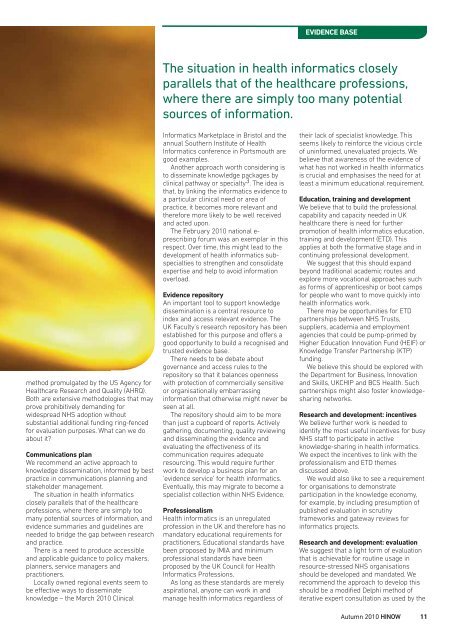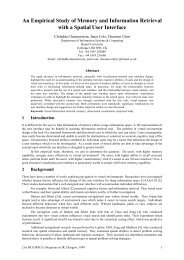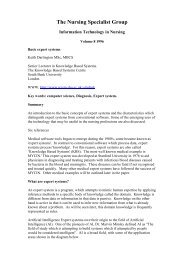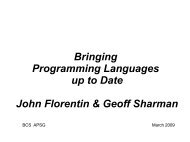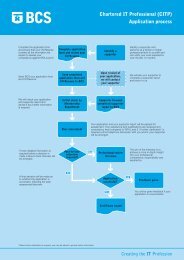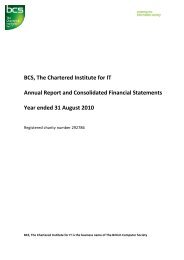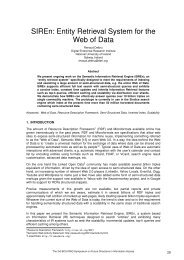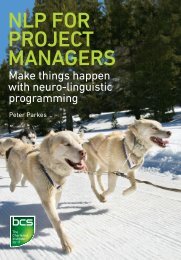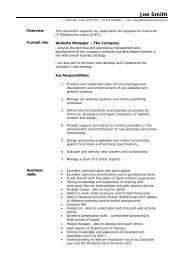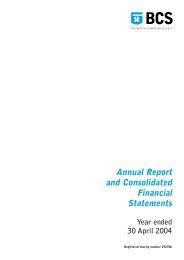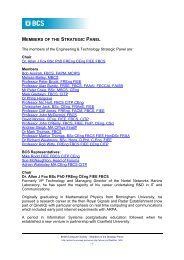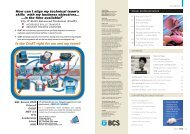DIGITAL DICTATION Reporting on the benefits of digital ... - BCS
DIGITAL DICTATION Reporting on the benefits of digital ... - BCS
DIGITAL DICTATION Reporting on the benefits of digital ... - BCS
You also want an ePaper? Increase the reach of your titles
YUMPU automatically turns print PDFs into web optimized ePapers that Google loves.
method promulgated by <strong>the</strong> US Agency for<br />
Healthcare Research and Quality (AHRQ).<br />
Both are extensive methodologies that may<br />
prove prohibitively demanding for<br />
widespread NHS adopti<strong>on</strong> without<br />
substantial additi<strong>on</strong>al funding ring-fenced<br />
for evaluati<strong>on</strong> purposes. What can we do<br />
about it?<br />
Communicati<strong>on</strong>s plan<br />
We recommend an active approach to<br />
knowledge disseminati<strong>on</strong>, informed by best<br />
practice in communicati<strong>on</strong>s planning and<br />
stakeholder management.<br />
The situati<strong>on</strong> in health informatics<br />
closely parallels that <strong>of</strong> <strong>the</strong> healthcare<br />
pr<strong>of</strong>essi<strong>on</strong>s, where <strong>the</strong>re are simply too<br />
many potential sources <strong>of</strong> informati<strong>on</strong>, and<br />
evidence summaries and guidelines are<br />
needed to bridge <strong>the</strong> gap between research<br />
and practice.<br />
There is a need to produce accessible<br />
and applicable guidance to policy makers,<br />
planners, service managers and<br />
practiti<strong>on</strong>ers.<br />
Locally owned regi<strong>on</strong>al events seem to<br />
be effective ways to disseminate<br />
knowledge – <strong>the</strong> March 2010 Clinical<br />
EVIDENCE BASE<br />
The situati<strong>on</strong> in health informatics closely<br />
parallels that <strong>of</strong> <strong>the</strong> healthcare pr<strong>of</strong>essi<strong>on</strong>s,<br />
where <strong>the</strong>re are simply too many potential<br />
sources <strong>of</strong> informati<strong>on</strong>.<br />
Informatics Marketplace in Bristol and <strong>the</strong><br />
annual Sou<strong>the</strong>rn Institute <strong>of</strong> Health<br />
Informatics c<strong>on</strong>ference in Portsmouth are<br />
good examples.<br />
Ano<strong>the</strong>r approach worth c<strong>on</strong>sidering is<br />
to disseminate knowledge packages by<br />
clinical pathway or specialty 3 . The idea is<br />
that, by linking <strong>the</strong> informatics evidence to<br />
a particular clinical need or area <strong>of</strong><br />
practice, it becomes more relevant and<br />
<strong>the</strong>refore more likely to be well received<br />
and acted up<strong>on</strong>.<br />
The February 2010 nati<strong>on</strong>al eprescribing<br />
forum was an exemplar in this<br />
respect. Over time, this might lead to <strong>the</strong><br />
development <strong>of</strong> health informatics subspecialties<br />
to streng<strong>the</strong>n and c<strong>on</strong>solidate<br />
expertise and help to avoid informati<strong>on</strong><br />
overload.<br />
Evidence repository<br />
An important tool to support knowledge<br />
disseminati<strong>on</strong> is a central resource to<br />
index and access relevant evidence. The<br />
UK Faculty’s research repository has been<br />
established for this purpose and <strong>of</strong>fers a<br />
good opportunity to build a recognised and<br />
trusted evidence base.<br />
There needs to be debate about<br />
governance and access rules to <strong>the</strong><br />
repository so that it balances openness<br />
with protecti<strong>on</strong> <strong>of</strong> commercially sensitive<br />
or organisati<strong>on</strong>ally embarrassing<br />
informati<strong>on</strong> that o<strong>the</strong>rwise might never be<br />
seen at all.<br />
The repository should aim to be more<br />
than just a cupboard <strong>of</strong> reports. Actively<br />
ga<strong>the</strong>ring, documenting, quality reviewing<br />
and disseminating <strong>the</strong> evidence and<br />
evaluating <strong>the</strong> effectiveness <strong>of</strong> its<br />
communicati<strong>on</strong> requires adequate<br />
resourcing. This would require fur<strong>the</strong>r<br />
work to develop a business plan for an<br />
‘evidence service’ for health informatics.<br />
Eventually, this may migrate to become a<br />
specialist collecti<strong>on</strong> within NHS Evidence.<br />
Pr<strong>of</strong>essi<strong>on</strong>alism<br />
Health informatics is an unregulated<br />
pr<strong>of</strong>essi<strong>on</strong> in <strong>the</strong> UK and <strong>the</strong>refore has no<br />
mandatory educati<strong>on</strong>al requirements for<br />
practiti<strong>on</strong>ers. Educati<strong>on</strong>al standards have<br />
been proposed by IMIA and minimum<br />
pr<strong>of</strong>essi<strong>on</strong>al standards have been<br />
proposed by <strong>the</strong> UK Council for Health<br />
Informatics Pr<strong>of</strong>essi<strong>on</strong>s.<br />
As l<strong>on</strong>g as <strong>the</strong>se standards are merely<br />
aspirati<strong>on</strong>al, any<strong>on</strong>e can work in and<br />
manage health informatics regardless <strong>of</strong><br />
<strong>the</strong>ir lack <strong>of</strong> specialist knowledge. This<br />
seems likely to reinforce <strong>the</strong> vicious circle<br />
<strong>of</strong> uninformed, unevaluated projects. We<br />
believe that awareness <strong>of</strong> <strong>the</strong> evidence <strong>of</strong><br />
what has not worked in health informatics<br />
is crucial and emphasises <strong>the</strong> need for at<br />
least a minimum educati<strong>on</strong>al requirement.<br />
Educati<strong>on</strong>, training and development<br />
We believe that to build <strong>the</strong> pr<strong>of</strong>essi<strong>on</strong>al<br />
capability and capacity needed in UK<br />
healthcare <strong>the</strong>re is need for fur<strong>the</strong>r<br />
promoti<strong>on</strong> <strong>of</strong> health informatics educati<strong>on</strong>,<br />
training and development (ETD). This<br />
applies at both <strong>the</strong> formative stage and in<br />
c<strong>on</strong>tinuing pr<strong>of</strong>essi<strong>on</strong>al development.<br />
We suggest that this should expand<br />
bey<strong>on</strong>d traditi<strong>on</strong>al academic routes and<br />
explore more vocati<strong>on</strong>al approaches such<br />
as forms <strong>of</strong> apprenticeship or boot camps<br />
for people who want to move quickly into<br />
health informatics work.<br />
There may be opportunities for ETD<br />
partnerships between NHS Trusts,<br />
suppliers, academia and employment<br />
agencies that could be pump-primed by<br />
Higher Educati<strong>on</strong> Innovati<strong>on</strong> Fund (HEIF) or<br />
Knowledge Transfer Partnership (KTP)<br />
funding.<br />
We believe this should be explored with<br />
<strong>the</strong> Department for Business, Innovati<strong>on</strong><br />
and Skills, UKCHIP and <strong>BCS</strong> Health. Such<br />
partnerships might also foster knowledgesharing<br />
networks.<br />
Research and development: incentives<br />
We believe fur<strong>the</strong>r work is needed to<br />
identify <strong>the</strong> most useful incentives for busy<br />
NHS staff to participate in active<br />
knowledge-sharing in health informatics.<br />
We expect <strong>the</strong> incentives to link with <strong>the</strong><br />
pr<strong>of</strong>essi<strong>on</strong>alism and ETD <strong>the</strong>mes<br />
discussed above.<br />
We would also like to see a requirement<br />
for organisati<strong>on</strong>s to dem<strong>on</strong>strate<br />
participati<strong>on</strong> in <strong>the</strong> knowledge ec<strong>on</strong>omy,<br />
for example, by including presumpti<strong>on</strong> <strong>of</strong><br />
published evaluati<strong>on</strong> in scrutiny<br />
frameworks and gateway reviews for<br />
informatics projects.<br />
Research and development: evaluati<strong>on</strong><br />
We suggest that a light form <strong>of</strong> evaluati<strong>on</strong><br />
that is achievable for routine usage in<br />
resource-stressed NHS organisati<strong>on</strong>s<br />
should be developed and mandated. We<br />
recommend <strong>the</strong> approach to develop this<br />
should be a modified Delphi method <strong>of</strong><br />
iterative expert c<strong>on</strong>sultati<strong>on</strong> as used by <strong>the</strong><br />
Autumn 2010 HINOW 11


